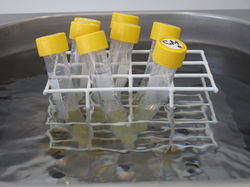
BIOTECHNOLOGY IN RIDESA
In addition to conventional breeding, professors and researchers from the various federal universities that make up RIDESA have also been working in the field of sugarcane biotechnology, with the main goal of supporting breeding activities and training human resources to work in this important area.
Among the activities developed in this field are plant tissue culture, genetic transformation (transgenics), molecular biology (search for genes of biotechnological interest, genome and transcriptome sequencing), and molecular marker technology.
To bring together professors, researchers, and students working in this area, the CNPq Research Group “Sugarcane Biotechnology of RIDESA” was established in 2010 <dgp.cnpq.br/dgp/espelhogrupo/1478024296719594>. This research group is led by professors from UFPR and UFSCar and conducts both basic and applied research in the following areas:
-
Characterization and conservation of RIDESA’s germplasm bank;
-
Genomic selection and genotyping platforms;
-
Gene prospecting in sugarcane;
-
Structural technology – vectors/promoters;
-
Tissue culture and genetic transformation.
In the area of molecular markers, UFSCar and UFG stand out. The large-scale development and genotyping of SSR and SNP markers has been one of the main research objectives at these universities. These studies aim to incorporate genomic selection into the routine of the conventional breeding program. Furthermore, UFSCar is focused on prospecting genes associated with abiotic stress, with an emphasis on aluminum tolerance.
Plant tissue culture includes in vitro techniques using nutrient media, under aseptic conditions, involving cells, tissues, or organs of plants, under controlled light and temperature. For sugarcane, the primary use of tissue culture is in micropropagation, allowing for faster production of healthier seedlings. In this area, UFRRJ in Campos, Rio de Janeiro, and UFPR are notable. UFPR has focused on somatic embryogenesis for regenerating different RB varieties and clones—an essential process in the transformation of sugarcane. Researchers from UFS, UFG, and UFV are also active in this field.
The development of transgenic plants is another key focus within RIDESA’s biotechnology area. UFPR has the necessary infrastructure and authorizations to generate and evaluate transgenic sugarcane plants. This university has been working on sugarcane transformation aimed mainly at studying the expression of various genes to increase tolerance to abiotic stresses, particularly drought. Similarly, UFSCar is working to understand the in vitro behavior of new RB varieties for generating transgenic sugarcane.
In March 2014, UFSCar inaugurated the Plant Biotechnology Laboratory, expanding RIDESA’s infrastructure for research and development in sugarcane biotechnology across its various areas. Financial support for RIDESA’s biotechnology initiatives has been obtained from institutions such as: FAPESP (São Paulo State), CNPq, CAPES, FINEP, Banco do Nordeste, and Petrobras, through funding programs like INCT-Bioethanol and Bioen-FAPESP.
Among RIDESA’s university partners in this field are: IAPAR, UNICAMP, USP-IQ, USP-ESALQ, EMBRAPA Agroenergia, EMBRAPA Clima Temperado, and UFGD.
 |  |
|---|---|
 |  |
 |  |
